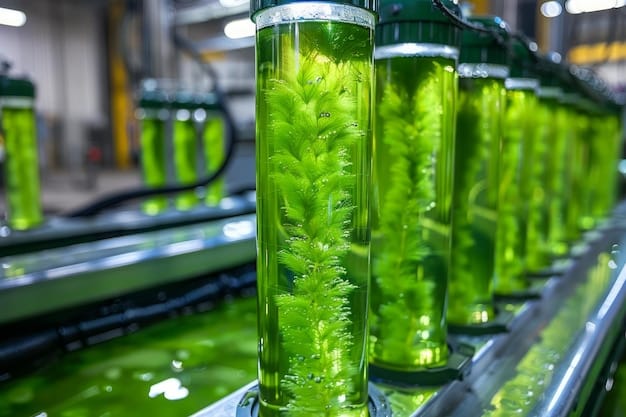Algae Biofuel Revolution: Can It Replace Fossil Fuels by 2040?

Algae biofuel presents a sustainable alternative to fossil fuels, with the potential to reshape the US transportation sector by 2040 through innovations in cultivation, harvesting, and conversion technologies, though challenges in scalability and cost-effectiveness remain.
Can the algae biofuel revolution: can this promising technology replace fossil fuels in the US transportation sector by 2040? Imagine a future where our cars, trucks, and planes run on fuel derived from algae, a sustainable and renewable resource.
Understanding Algae Biofuel: A Promising Alternative
Algae biofuel is rapidly gaining attention as a realistic substitute for traditional fuels. It offers a potential solution to reduce our reliance on fossil fuels, minimizing environmental impact and securing a sustainable energy future. The versatility of biofuels derived from algae makes them a significant player in the renewable energy landscape.
What is Algae Biofuel?
Algae biofuel includes numerous fuel types derived from algae biomass. It’s sustainable because algae can be cultivated using minimal land and water resources, and can even utilize wastewater.
Benefits of Algae Biofuel Over Traditional Fossil Fuels
Algae biofuel excels as a green alternative due to its low carbon footprint and reduced greenhouse gas emissions. Its production processes are inherently more eco-friendly than traditional fossil fuel methods.

- Reduced Carbon Footprint: Algae consume CO2 during growth, offsetting emissions from combustion.
- Renewable Resource: Algae can be harvested multiple times a year, ensuring a continuous fuel supply.
- Biodegradable: Algae biofuel is biodegradable, reducing environmental hazards from spills.
In conclusion, algae biofuel constitutes a practical and environmentally conscious substitute for fossil fuels, bolstered by the inherent sustainability of algae cultivation and its capability to markedly diminish greenhouse gas emissions and ecological menaces.
The Current State of Algae Biofuel Technology
Advancements in algae biofuel technology are making it increasingly viable as a replacement for fossil fuels. Current research is focused on several key areas, including improving algae strains, optimizing cultivation techniques, and enhancing fuel extraction processes.
Advances in Algae Strain Development
Genetic engineering and selective breeding are being used to develop algae strains that produce more oil, grow faster, and are more resistant to environmental stressors. These improvements are crucial for maximizing biofuel yields.
Innovations in Cultivation and Harvesting
Open ponds, closed photobioreactors, and vertical farming systems are being explored to enhance algae cultivation. Innovations in harvesting techniques, such as flocculation and filtration, are improving efficiency and reducing costs.

- Improved Oil Production: Genetically modified algae can produce significantly more oil per cell.
- Efficient Cultivation: Closed photobioreactors offer controlled environments leading to higher growth rates.
- Cost-Effective Harvesting: Advances in flocculation reduce the energy needed to harvest algae biomass.
To summarize, advanced technology ensures increased efficiency in algae biofuel production. These developments underscore the feasibility of algae biofuel as a realistic substitute for traditional fossil fuels, enhancing sustainability and affordability within the renewable energy domain.
Challenges and Roadblocks in Algae Biofuel Implementation
Despite the potential benefits, algae biofuel faces several challenges that need to be addressed to achieve widespread implementation. These challenges range from technical hurdles to economic and regulatory barriers.
High Production Costs
Currently, the cost of producing algae biofuel is higher than that of fossil fuels. This is primarily due to the energy-intensive processes involved in cultivation, harvesting, and conversion. Reducing these costs is essential for making algae biofuel economically competitive.
Scalability Issues
Scaling up algae biofuel production to meet the demands of the transportation sector requires significant infrastructure investments. Ensuring a consistent and reliable supply of algae biomass is a major challenge.
- Infrastructure Development: Large-scale cultivation facilities require substantial capital investment.
- Energy Consumption: Energy-intensive processes raise the overall cost.
- Regulatory Hurdles: Clear regulatory frameworks are needed to guide production and distribution.
In essence, overcoming these hurdles is crucial for algae biofuel to become a leading choice. Creative answers tackling production expenses, scalability issues, and regulatory impediments are indispensable for achieving its widespread usage.
Government Policies and Incentives Supporting Algae Biofuel
Government support in the form of policies and incentives is vital for promoting the development and adoption of algae biofuel. These measures can help to level the playing field and encourage investment in this promising technology.
Federal and State Initiatives
Various federal and state programs offer grants, tax credits, and loan guarantees to support algae biofuel research, development, and deployment. These initiatives help to reduce the financial risks associated with investing in new technologies.
Renewable Fuel Standards (RFS)
The RFS mandates the blending of renewable fuels into the transportation fuel supply, creating a market for algae biofuel. Increasing the RFS targets for advanced biofuels can further stimulate demand and drive innovation.
- Financial Support: Government incentives lower investment risks and promote innovation.
- Market Creation: RFS guarantees a market share for algae biofuel.
- Regulatory Framework: Clear regulations provide stability and direction for the industry.
Overall, government assistance through strategies and incentives performs a pivotal role in fostering the maturation and incorporation of algae biofuel. These supportive steps are fundamental for conquering economic obstacles and guaranteeing wide acceptance of the sustainable solution.
Potential Economic and Environmental Impacts
The widespread adoption of algae biofuel could have significant economic and environmental impacts, both positive and negative. Understanding these impacts is crucial for making informed decisions about its development and deployment.
Economic Benefits
Algae biofuel production can create jobs in rural areas, stimulate economic growth, and reduce dependence on foreign oil. It can also provide new revenue streams for farmers and landowners.
Environmental Benefits
Algae biofuel can reduce greenhouse gas emissions, improve air quality, and reduce water pollution compared to fossil fuels. Additionally, algae cultivation can help to remediate wastewater and sequester carbon dioxide.
- Job Creation: New jobs in cultivation, harvesting, and processing can boost rural economies.
- Reduced Emissions: Lowering greenhouse gas emissions helps combat climate change.
- Waste Remediation: Algae cultivation can clean wastewater and remove pollutants.
Conclusively, incorporating algae biofuel harbors significant financial and ecological consequences. Algae biofuel pledges to make noteworthy offerings to the economy and ecosystem with careful planning and sustainable execution.
Algae Biofuel in 2040: A Vision for the Future
Looking ahead to 2040, algae biofuel has the potential to play a significant role in the US transportation sector. Advances in technology, supportive policies, and growing environmental concerns could drive widespread adoption.
Scenario 1: Optimistic Outlook
In this scenario, breakthroughs in algae strain development and cultivation techniques lead to significant cost reductions. Supportive government policies and strong consumer demand drive rapid expansion, making algae biofuel a major player in the transportation fuel market.
Scenario 2: Moderate Growth
In this scenario, technological advancements and policy support are more gradual, leading to moderate growth in the algae biofuel sector. Algae biofuel becomes a niche fuel used in specific applications, such as aviation and heavy-duty trucking.
- Widespread Adoption: Algae biofuel powers a significant portion of the transportation sector.
- Niche Applications: Algae biofuel is used in areas where it offers unique advantages.
- Continued Research: Ongoing research and development further improve its viability.
In summary, these scenarios underscore the essential role of technological evolution, supportive policies, and consumer eagerness in defining the trajectory of algae biofuel in the years ahead.
| Key Point | Brief Description |
|---|---|
| 🌱 Algae Biofuel Basics | Derived from algae, a renewable and sustainable resource. |
| 🔬 Tech Advances | Improvements in algae strains and cultivation methods. |
| 💰 Challenges | High production costs and scalability issues. |
| 政策 Government Support | Policies and incentives promoting development and adoption. |
Frequently Asked Questions (FAQ)
Algae biofuel is fuel derived from algae biomass, representing a sustainable and renewable alternative to traditional fossil fuels by utilizing algae’s ability to efficiently convert sunlight and CO2 into energy-rich compounds.
Algae biofuel helps the environment because it reduces greenhouse gas emissions by capturing carbon dioxide during algae growth and diminishes reliance on fossil fuels, potentially leading to cleaner air and water.
The main challenges are high production costs, difficulties in scaling up production to meet demand, and the need for further technological advancements in cultivation and harvesting methods.
Governments play a crucial role by providing funding, incentives, and regulatory support to encourage research, development, and commercialization of algae biofuel, thus fostering innovation and market growth in this sector.
Replacing fossil fuels entirely by 2040 is ambitious, but with continued technological advancements, supportive policies, and increased investment, algae biofuel can significantly contribute to the US energy mix and reduce reliance on fossil fuels.
Conclusion
To conclude, while significant technical and economic challenges remain, the algae biofuel revolution: can this promising technology replace fossil fuels in the US transportation sector by 2040? It represents a promising pathway towards a more sustainable and secure energy future for the United States. Continued investment in research, supportive government policies, and innovative business models will be essential to unlock the full potential of algae biofuel and achieve its widespread adoption in the coming decades. As we move towards 2040, algae-based fuels hold considerable promise in transforming the US transportation sector, delivering environmental and economic gains.





